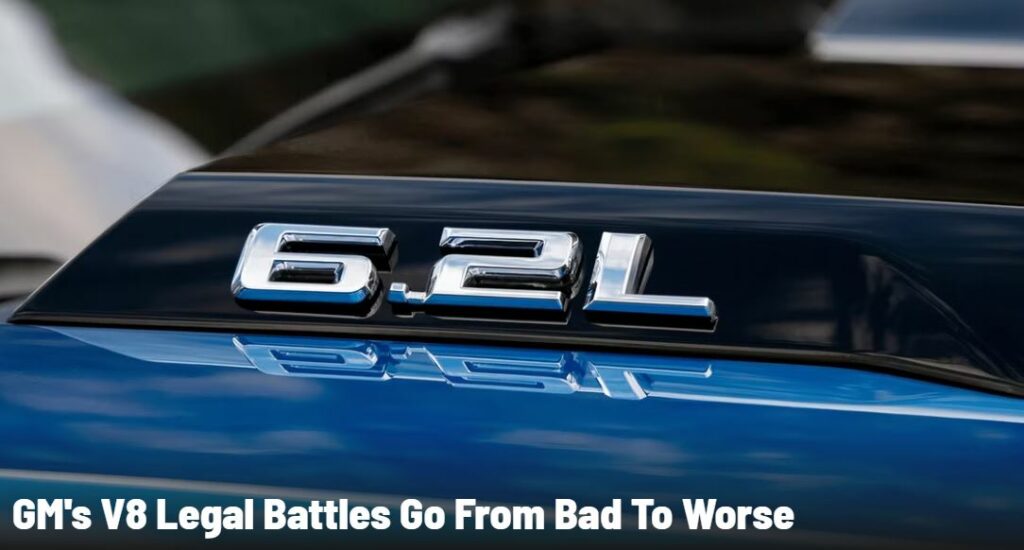GM Faces Class Action Over Catastrophic L87 Engine Defect in 2019–2024 Full-Size Trucks and SUVs Featured

Consumers allege 6.2L V8 engine failure risks safety, devalues vehicles, and burdens owners with costly repairs.
General Motors (GM) is facing a nationwide class action lawsuit over a widespread engine defect affecting nearly one million full-size trucks and SUVs equipped with the 6.2L V8 L87 engine, introduced in 2019. Plaintiffs claim that the engines are prone to sudden and catastrophic internal failures that leave vehicles inoperable and require expensive, often futile repairs.
What Vehicles Are Affected?
The lawsuit targets L87-equipped vehicles from model years 2019 through 2024, including:
- 2019–2024 Chevrolet Silverado 1500
- 2021–2024 Chevrolet Tahoe
- 2021–2024 Chevrolet Suburban
- 2019–2024 GMC Sierra 1500
- 2021–2024 GMC Yukon & Yukon XL
- 2021–2024 Cadillac Escalade & Escalade ESV
These vehicles were marketed as durable and dependable, yet according to plaintiffs, owners report engine failure within weeks—or even within days—of purchase. One engine reportedly failed after just four miles.
Nature of the Alleged Defect
The lawsuit alleges the L87 engines suffer from critical internal component failures, specifically due to:
- Improper or missing circlips and wrist pins, leading to connecting rod failure
- Defective crankshaft and rod bearings, which cannot withstand engine loads
- Resulting in engine seizure, misfires, and total power loss
According to the National Highway Traffic Safety Administration (NHTSA), which opened an investigation in January 2025, over 1,000 consumer complaints have been filed describing “internal engine component failure” and the risks of loss of control while driving.
GM’s Response and Criticism of Its Recall
In April 2025, GM initiated a recall covering approximately 598,000 vehicles, instructing dealers to scan for diagnostic trouble code P0016. If present, the engine would be replaced. If not, GM’s fix was to:
- Replace the oil with a thicker-grade oil, and
- Install a revised oil cap
However, plaintiffs argue this response is inadequate and deceptive, alleging GM is:
- Replacing failed engines with the same flawed L87 engines
- Not notifying all owners
- Performing minimal oil-related services that fail to fix the defect
Allegations in the Lawsuit
- GM knew of the defect since at least 2021 based on warranty claims and internal testing
- The defect results in sudden engine failure and significant diminution of vehicle value
- Consumers have been left stranded for weeks or months awaiting repairs
- GM allegedly breached express and implied warranties and violated consumer protection laws
Who Is Covered?
The lawsuit seeks to represent all U.S. residents who purchased or leased a 2019–2024 model of the affected vehicles.
What Consumers Can Do
If you own or lease an affected GM vehicle with the 6.2L L87 engine and have experienced ticking, knocking, stalling, or total engine failure, you may be eligible to participate in the lawsuit. Keep documentation of:
- Purchase/lease agreement
- Maintenance and repair records
- Communications with GM or dealerships
- Any recall-related services
Know Your Rights
If you’ve experienced engine problems—or simply own one of the affected models—you may be entitled to:
- Repair reimbursement
- Replacement of defective parts or full engines
- Diminished value compensation
- Extended warranty or buyback relief
Act Now – Join the Lawsuit
Fill out the form on this page to see if you qualify. This class action covers all individuals in the U.S. who purchased or leased one of the above GM vehicles between 2019 and 2024, excluding resales.
By submitting the form, you can join other drivers holding GM accountable for marketing these vehicles as “rugged” and “reliable”—despite knowing about the defect as early as 2021.









